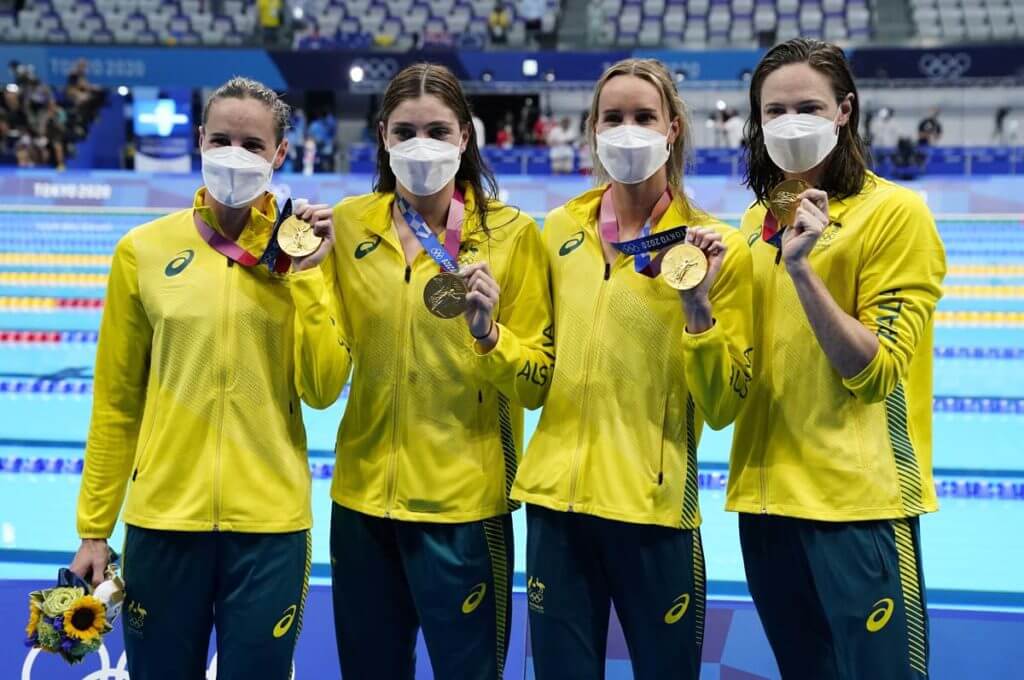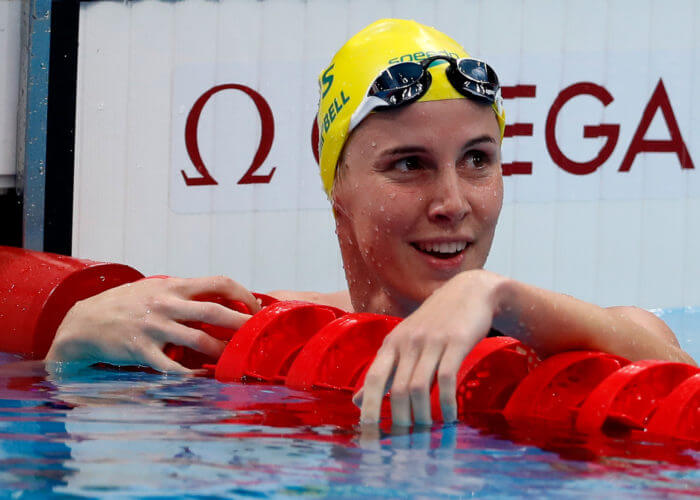Tokyo Flashback: It’s a Three-Peat and World Record For Australia in 400 Freestyle Relay

Editorial content for the 2021 Tokyo Olympic Games coverage is sponsored by GMX7.
See full event coverage. Follow GMX7 on Instagram at @GMX7training #gmx7

Tokyo Flashback: It’s a Three-Peat and World Record For Australia in 400 Freestyle Relay
One year has passed since the Olympic Games, delayed by a year due to COVID-19, unfolded in Tokyo. To celebrate what went down in the Japanese capital, Swimming World is revisiting the championship finals – each on their one-year anniversary – by once again running the stories that were posted after the medals were decided.
The outcome was expected and, yet, Australia still found a way to dazzle as the first day of finals at the Olympic Games in Tokyo came to a conclusion. All it took was a world record in the 400-meter freestyle relay – and quite a global mark it was.
The foursome of Bronte Campbell, Meg Harris, Emma McKeon and Cate Campbell blasted a time of 3:29.69 at the Tokyo Aquatics Centre to wipe nearly a half-second off the previous world record of 3:30.05, and hand Australia its third consecutive Olympic crown in the event. Cate Campbell, the oldest of the sister combination, has been the common denominator on all three relays.
Few events on the Olympic program are no-doubt-about-it affairs, but the outcome of the first relay of the Tokyo Games truly has been long known. Australia boasts a sprint contingent that is unrivaled, the rest of the world envious of the Dolphins’ depth. Members of the Aussies’ prelim squad, Mollie O’Callaghan and Madison Wilson were cheerleaders during the final, and their skills certainly would have been welcomed by any other nation.
After Australia secured the top seed with a 3:31.73 marker in prelims, there was little doubt the world record was going down. The Aussies couldn’t go wrong in the selection of their two holdover swimmers from the opening round and had the knowledge they would sub in McKeon and the elder Campbell for the final. Those additions meant bolstering the relay with an athlete with the fastest time in the world this year and a woman who rates as one of the greatest relay swimmers in history.

Photo Courtesy: Delly Carr
From the start, Australia backed up its expectations, as the younger Campbell split 53.01 and gave way to the 53.09 of Harris. Then the dominance really started as McKeon, who has been 52.19 in the 100 free this year, produced a split of 51.35 to create a major cushion between Australia and the rest of the field. Campbell closed in 52.24, an anchor leg that simply solidified Australia’s status as the event’s premier power.
“Depth and high standards,” Cate Campbell said of the Aussie reign. “We’ve all really had to step up year in and year out, but also supporting each other. We come together at least once a year and train together for a full week. We push each other and challenge each other but we do that in a really supportive way. There is no malice and no animosity toward one another, and I think that has just spoken volumes. This is the third Olympics in a row that Australia has won this event and that in itself really needs to be celebrated. To do that for 13 years in a row is incredible.”
The gap between Australia and Canada, which picked up the silver medal on the strength of Penny Oleksiak’s anchor effort, was more than three seconds. That difference is an eternity and surely will have coaches around the world looking to Australia to glean ideas for how to enhance their sprinting programs.
En route to the silver medal, Canada benefited from Oleksiak’s excellence down the stretch. Trailing the United States’ Simone Manuel when they entered the water, Oleksiak split 52.26 to rally the Canadians to the second step on the podium. She was joined by Kayla Sanchez (53.42), Maggie MacNeil (53.47) and Rebecca Smith (53.63) and furthered her reputation as a big-race performer. Four years ago in Rio de Janeiro, Oleksiak shared gold with Manuel in the 100 freestyle and added three other medals.
For the United States, its bronze medal was a positive result considering the uncertainty that emerged surrounding the relay during prelims. When Team USA qualified only fifth during heats, it seemed plausible that the U.S. could miss the podium. Instead, it did enough to medal, thanks to the combination of Erika Brown, Abbey Weitzeil, Natalie Hinds and Manuel. The Americans were timed in 3:32.81, with the Netherlands fourth at 3:33.70.
Given Manuel’s difficult past few months, a period in which she has dealt with Overtraining Syndrome, her closing leg of 52.96 to ensure a podium place for the United States was a badge of guts. Additionally, Weitzeil gave an all-important split of 52.68 and Hinds was quicker than her prelims effort that earned her a spot on the squad for finals.
“I don’t think it mattered if I was on this relay or not,” Manuel said. “I’ve seen improvement since going to Trials, and I think it doesn’t do me any justice to step up on the block and not be confident in the training that I’ve done. Even though the last couple of months haven’t been the greatest for me, I’ve trained really hard the last four or five years, so eventually that hard work will show up. I just have to keep trusting in myself.”
Obviously, Australia has developed a deep trust in the implementation of its sprint training that has led to untouchable status.
“It’s very special to be part of this relay. It always is,” Bronte Campbell said. “The competition in Australia is fierce for this relay and that’s what makes us so competitive on the international stage. It’s more than us competing against each other for the spots on the relay because we really are an extended team, and we support each other. That is why we have managed to have such a strong team for so long.”
Women’s 400 Freestyle Relay
World Record: Australia (Shayna Jack, Bronte Campbell, Emma McKeon, Cate Campbell), 3:30.05 (2018)
Olympic Record: Australia (Emma McKeon, Brittany Elmslie, Bronte Campbell, Cate Campbell), 3:30.65 (2016)
Final Results
1. Australia, 3:29.69
2. Canada, 3:32.78
3. United States, 3:32.81
4. Netherlands, 3:33.70
5. Great Britain, 3:33.96
6. Sweden, 3:34.69
7. China, 3:34.76
8. Denmark, 3:35.70




